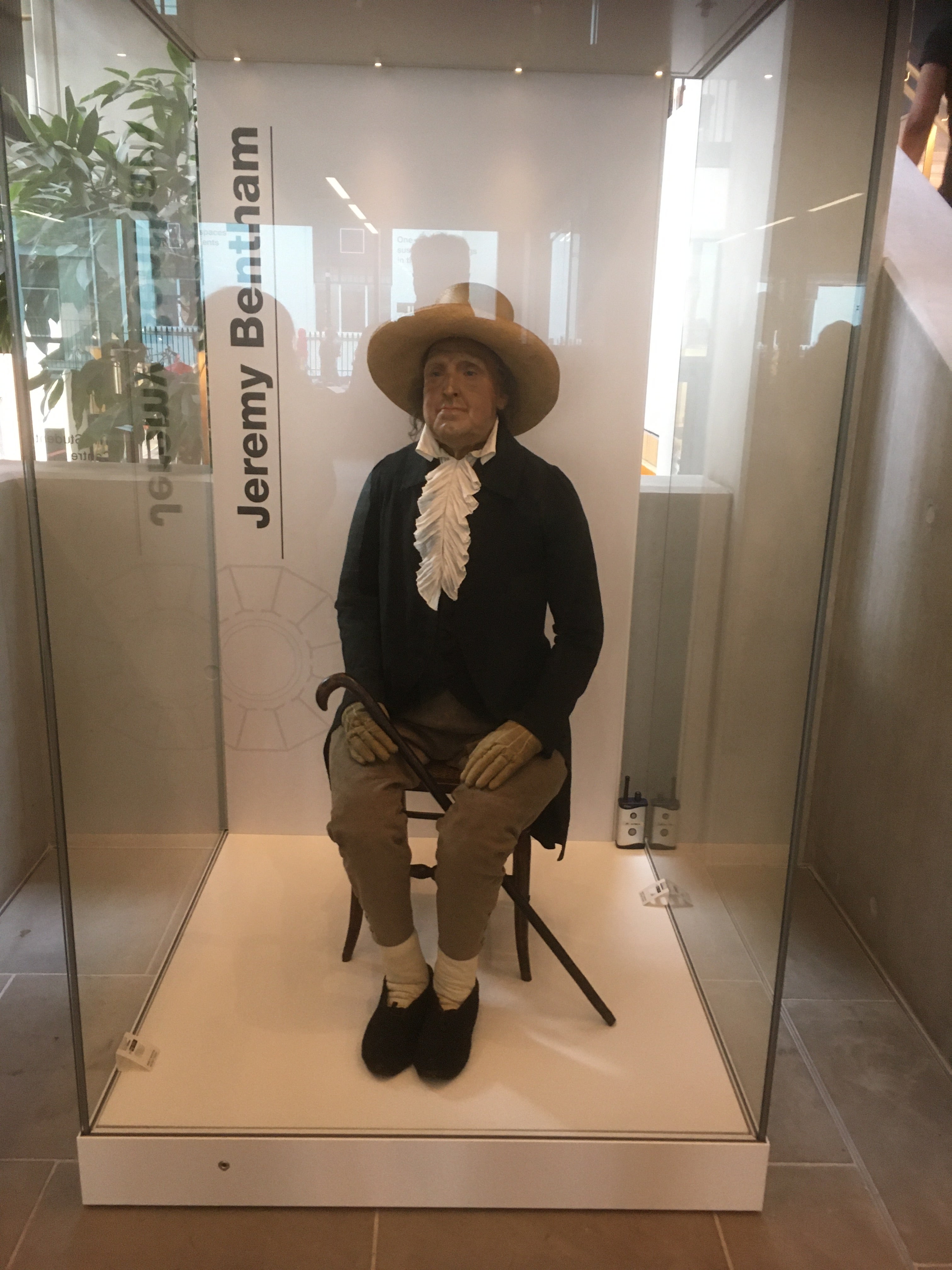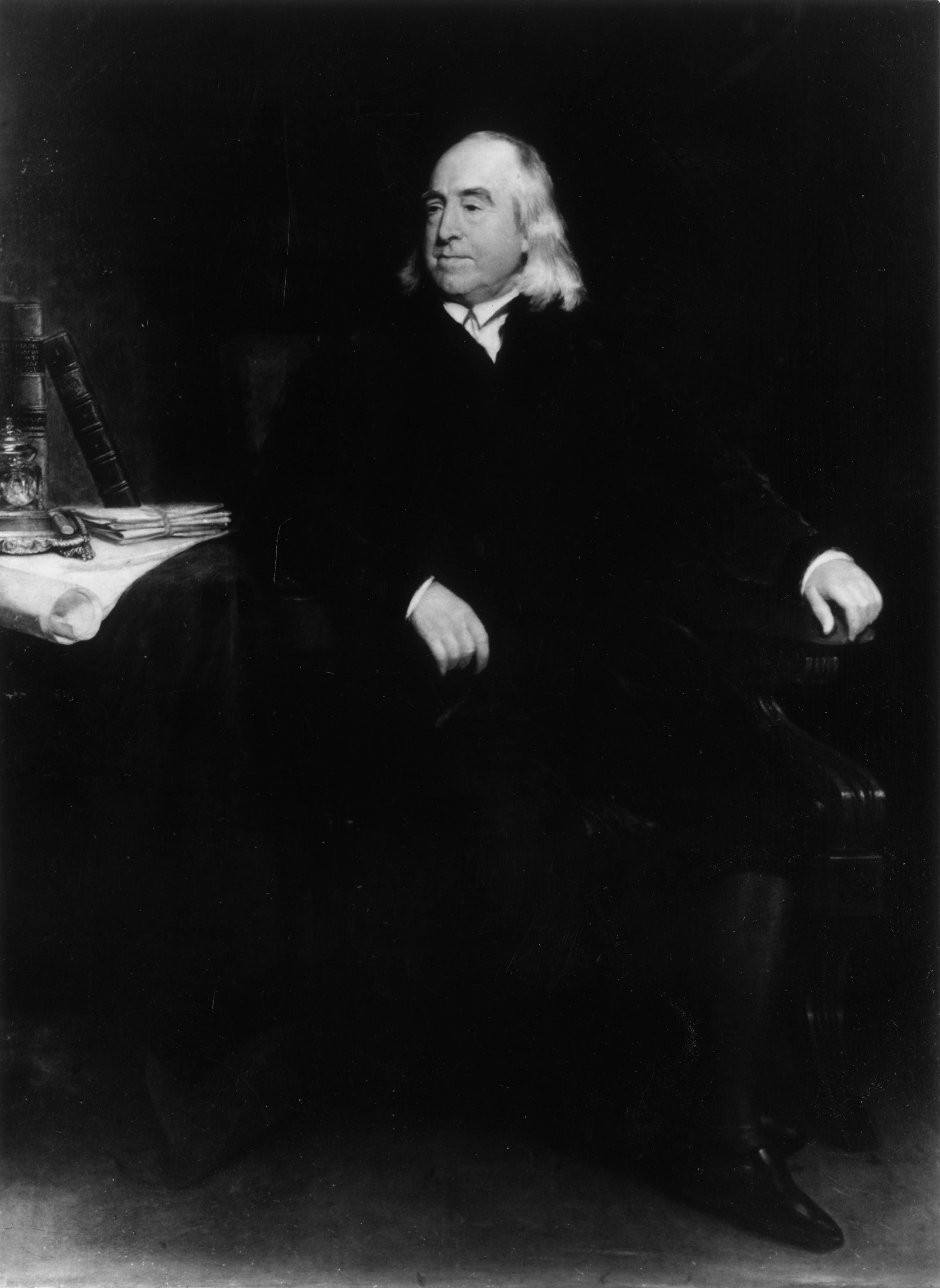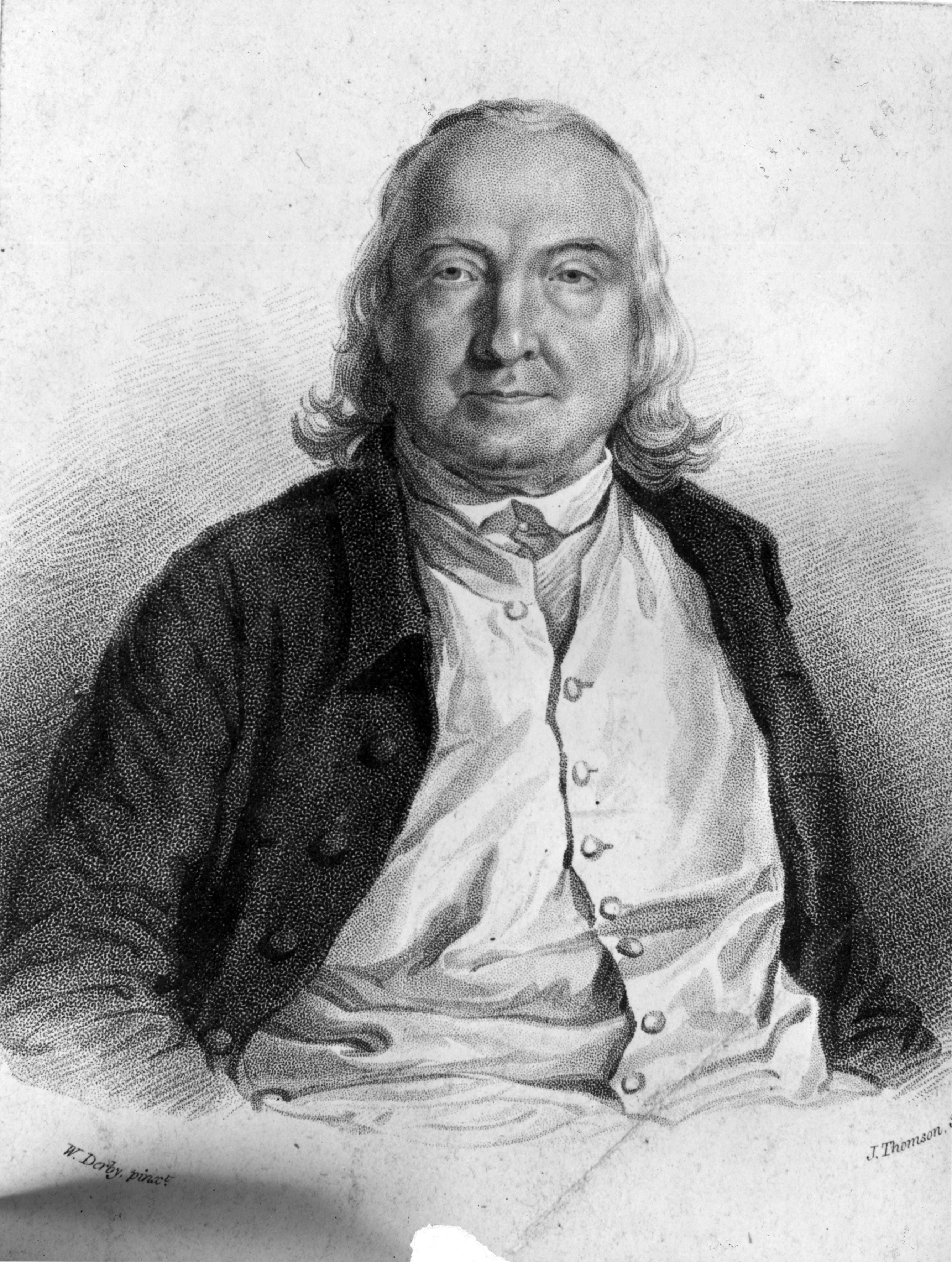Jeremy Bentham: What makes an action right or wrong?
Jeremy Bentham was perhaps as much a social reformer as a philosopher and is also well known for his many inventions. His major contribution to philosophy is the theory of utilitarianism

If you are feeling a little ghoulish and find yourself at a loose end and in London, you can do worse than wander into the cloisters of University College. You will discover, encased in a mahogany and glass structure, nothing less than the mortal remains of Jeremy Bentham (1748-1832) seated in his usual chair in an attitude of relaxed contemplation and dressed in suitably restrained clothing, his favourite cane propped by his side. If you are very ghoulish you might be saddened to learn that the head is a wax dummy, though the skeleton under the clothes is real enough. The actual head, preserved “in the manner of the New Zealanders”, remains in the university’s safe for two reasons: first, the preservation process was not entirely successful, and it is probably too ghastly for display; second, it has gone missing a number of times. The pious students of King’s College, natural enemies of the humanists of University College, have absconded with it on at least two occasions – it was once discovered in a luggage locker in the Aberdeen rail station.
The auto-icon, as it is called, was entirely Bentham’s idea, and his reasons for it are outlined in his last work, Auto-Icon; or, Farther Uses of the Dead to the Living. Much of the book has to be tongue-in-cheek – it includes Bentham’s suggestion that the preserved bodies of the famous might serve as excellent lawn ornaments. But the auto-icon has a practical aim: the inspiration in his followers of certain useful feelings and beliefs. Bentham, though born to a line of lawyers and himself called to the bar in 1767, busied himself throughout his life not in the courtroom, but with all manner of practical schemes.
A practical mind
He worked on projects involving portable houses; a canal in Central America; a new prison design, the infamous Panopticon, which he hoped would “grind rogues honest”; central heating systems; refrigeration units; and counterfeit-proof bank notes. He had “conversation tubes” installed in his London home and slept in a sleeping bag of his own devising. He also coined a remarkable number of words: “maximise”, “minimise”, “rationale”, “demoralise”, “dynamic”, “unilateral”, “detachable”, “exhaustive”, “cross-examination”, “international” and “codification” among them. Not all of Bentham’s neologisms gained currency. Sadly, we have all but lost “catastatico-chrestic physiurgics”.

It is clear that John Stuart Mill was right to say that Bentham had an “essentially practical mind”. The projects he undertook throughout his life, even that of finding a use for himself after death, were all aimed at solving problems Bentham himself had identified. The problems that most exercised him, though, were difficulties in the law. His proposed solutions led to a political movement in which the variously named Benthamites, utilitarians or philosophical radicals agitated for social and legal reform in line with Bentham’s own thinking. Bentham and his followers proposed enlightened changes to the law on the treatment of animals, property, taxation, homosexuality, poverty, suffrage and much else. A large number of these proposals actually became law under the Reform Bill of 1832, and it is a clear fact that many lives have been the better for it.
Bentham saw, from a young age, inconsistencies in the very foundations of social and legal practices. As a student at Westminster School, Bentham was required to sign the Articles of Religion of the Church of England, but he identified in them numerous falsehoods, as well as contradictions with the actual teachings of the church. At Oxford University, he was a student of the legal scholar William Blackstone, but found himself unable to follow the lectures, fretted as they were with fallacious thinking. The difficulty, as Bentham saw it, lies in a kind of irrationality at the heart of the law. The law and the punishments it metes out seems tied not to rational principle, but to fictions, falsehoods and whatever it is which happens to offend the lawmakers most.
Instead of the arbitrary intuitions of lawmakers, Bentham grounds legal decision-making on a psychological fact: people act in their own interests, and those interests consist of getting pleasure and avoiding pain. Individual human happiness, then, consists in achieving a greater balance of pleasure over pain for the greatest number of people. We have here the beginnings of a system of value and a conception of the moral good rooted in human nature. Thus Bentham identifies a principle that is both moral and legal, the principle of utility or the greatest happiness principle. He characterises it as follows:
What makes an action right or wrong are its effects, in particular its psychological effects on people
“By the principle of utility is meant that principle which approves or disapproves of every action whatsoever, according to the tendency which it appears to have to augment or diminish the happiness of the party whose interest is in question … I say that of every action whatsoever; and therefore not only of every action of a private individual, but of every measure of government.”
The view, then, is obviously consequentialist. What makes an action right or wrong are its effects, in particular, its psychological effects on people.
There is an immediate difficulty with this proposal: it presupposes something apparently ridiculous, that pleasure is somehow quantifiable. There are, happily, many pleasures. Clearly, some pleasures are more pleasurable than others, but is it possible to say just how much more pleasurable? If I adopt Bentham’s principle, I must choose those actions which issue in a greater balance of pleasure over pain, but this can only be done if I have a clear way of comparing pleasures with pleasures, pains with pains, and pleasures with pains.
I happen to be free tonight – what to do? Shall I indulge my lust for sushi, go to the cinema, help the homeless, read some Walt Whitman, have a nap, repair to the pub? Is the pub a bit more pleasurable than eating sushi but less pleasurable than a nap or not quite as pleasurable as reading? Would the help I offer the homeless result in their pleasure, which is, in itself, greater than the pleasure I might take in a nap? Would helping the homeless bring them some pleasure which is immediately cancelled by the pain of my regret at being unable to do enough? I have no way of ranking or quantifying this morass of possible pleasure and pain, as it seems Bentham requires.

The arithmetic of pleasure
Bentham’s solution, the hedonistic calculus, is precisely what one expects from a resolutely practical mind – he not only claims that pleasure is quantifiable but offers a system for its quantification. He identifies several factors which might figure into any such calculation: the pleasure’s intensity, duration, certainty, propinquity, fecundity, purity and extent. Further, he considers the relative merits of kinds of pleasure (the pleasure attending sensation, possession, skill, friendship, reputation, power and malevolence) as well as the demerits of different kinds of pain (the pain of want, disappointment, regret, and so on). More than this, Bentham admits that pleasure and pain are, in some sense, relative to the perceiver, and this relativity itself depends on such factors as a person’s education, religion, and social standing – all of this must be taken into account. So, in choosing a course of action, we must: “Sum up all the values of all the pleasures on the one side, and those of all the pains on the other. The balance, if it be on the side of pleasure, will give the good tendency of the act up on the whole.”
Our lawmakers, then, have much to consider in formulating our laws. Enforcing the law, too, can become a little complicated. Suppose a string of heinous crimes is committed in a community. The crimes themselves cause pain to the victims, certainly, but there is further pain in the form of insecurity and anxiety suffered by everyone who fears they might be next. Perhaps there is a lot of suffering; worry that the government has lost control of the streets; maybe something near panic is in danger of breaking out. Think of the pain such fear might cause.

A good utilitarian law enforcement agent might reason as follows. We are holding someone from out of town for a minor traffic offence, someone with no known connection to these heinous crimes. Might it relieve the anxiety of the community, and improve the overall balance of pleasure over pain considerably, if we make this person a scapegoat? We could plant some evidence on him, charge him with the crimes, publicly punish him, maybe even execute him (by painless lethal injection, if you like). Maybe this will deter the real criminal. It would certainly reduce anxiety. Is this sort of thing not only permitted by the greatest happiness principle, but required by it? In this example at least – and one is enough – are we not morally compelled to kill someone we know is innocent?
The problem of justice
This might be called “the problem of justice” for Bentham. It seems, in the above case anyway, that certain things follow from the utilitarian view which conflict with our intuitions about what is just or at least what is right. The counter-example can tug in two directions. It can be concluded from it that utilitarianism cannot be the right way to think about morality, or it can be concluded that intuitions about justice are wrong.
Morality requires your interests sometimes standing in for my own – and this is the important bit – no matter who you are
The problem itself might be cast more generally: sometimes the only way to bring about a greater balance of pleasure over pain is by one or more of us suffering for someone else. Obviously, this is not to claim that the poor ought to suffer for the sake of the rich, quite the reverse. It is to get near a truth about the connection between putting aside one’s desires for someone else’s and the nature of morality. Utilitarianism captures something about what many take to be a fact about any moral system worth the name: its impersonal nature. Morality requires your interests sometimes standing in for my own –and this is the important bit – no matter who you are. Perhaps Bentham’s view captures this starkly, and our quibble with it reflects not a fault in utilitarianism, but the fact that being moral is not easy.
If you do make the pilgrimage and inspect Bentham’s bones, take a moment to stand back a little and observe the students slouching past on their way to the library. If you watch carefully enough and long enough, you will notice a few passers-by staring at Bentham, perhaps nodding almost imperceptibly, unconsciously. These are invariably philosophy students at University College, who know something of our debt to Bentham.
Major works
A Fragment on Government (1776)
An attack on the notion of tradition in law, as opposed to the grounding of law in rational principle. It contains much else, in particular arguments against certain dubious conceptions of political obligation.
Introduction to the Principles of Morals and Legislation (1789)
Provides an outline of the basis of Bentham’s proposed rational reform of law and morality. It includes a detailed account of the greatest happiness principle.






Join our commenting forum
Join thought-provoking conversations, follow other Independent readers and see their replies
Comments